#international institutions
Text
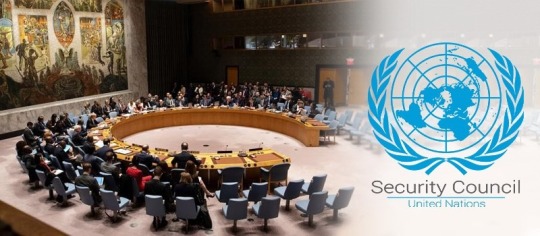
🇺🇳 🚨 FIVE NATIONS BEGIN ROLE AS NON-PERMANENT ELECTED MEMBERS OF THE UNITED NATIONS SECURITY COUNCIL
Five nations began their roles as elected members of the United Nations Security Council on Tuesday, beginning their two-year terms on the council, which commenced on Monday. However, Tuesday was the first working day for the Security Council following the New Year break.
The five countries beginning their two-year terms as non-permanent members on the UN Security Council are the following:
🇩🇿 Algeria
🇬🇾 Guyana
🇰🇷 South Korea
🇸🇱 Sierra Leone
🇸🇮 Slovenia
A flag instillation ceremony was held to mark the five nation's assuming of their responsibilities.
The five countries will replace the non-permanent members of 🇦🇱 Albania, 🇧🇷 Brazil, 🇬🇦 Gabon, 🇬🇭 Ghana, and the 🇦🇪 United Arab Emirates.
#source
@WorkerSolidarityNews
#united nations#algeria#guyana#south korea#sierra leone#slovenia#un security council#united nations security council#un news#politics#news#geopolitics#world news#global news#international news#breaking news#current events#news of the world#international institutions
16 notes
·
View notes
Text
The Council on Foreign Relations and other notions
youtube
Dr Daniel Estulin, best-selling author delves into power politics. A good ABC for those who would otherwise tune this stuff out.
#power#foreign policy#world politics#government#governance#world affairs#international relations#international institutions#public opinion#propaganda#council on foreign relations#economic power#federal reserve#private banking#think tank#tech#nato#democracy#monopolies#nation state#conflict#cults#daniel estulin#phd#best selling#author
0 notes
Text
Shedding Light on Calls for Reform: Criticisms and Visions at the U.N. General Assembly
The recent speeches at the U.N. General Assembly revealed discontent and demands for reform within international institutions. Explore the latest news and perspectives on shaping a fair and balanced world order.
#headline horizon#news#latest news#U.N. General Assembly#international institutions#calls for reform
1 note
·
View note
Text
Putting Deaf People on the Agenda.
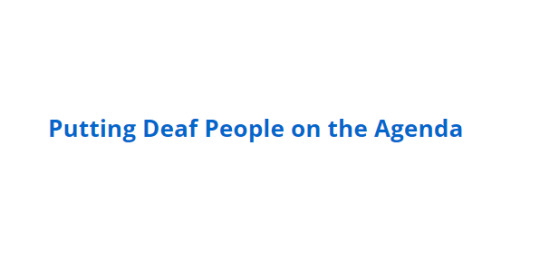
Thursday 21 September: Putting Deaf People on the Agenda
Deaf communities worldwide work to ensure policies and programs which reflect the lived realities of deaf people's lives. Today we call upon national governments, international institutions, research centres, and policymaking bodies to centre deaf people in their work. There is still a significant lack of data on deaf people’s lives and less on the right to use national sign languages. Today we highlight the research done on deaf lives to date and call for more disaggregated data collection and monitoring of deaf people and sign languages.
#national governments#international institutions#research centres#panel discussion#23 september#deaf people#international day of sign languages
0 notes
Text
Global Fragmentation: Persistent Geopolitical and Economic Challenges and Their Impact
The world is facing a multitude of geopolitical and economic challenges, which are driving global fragmentation. This fragmentation is having far-reaching consequences, as it affects economies, politics, and societies. The fragmentation can be seen in various areas, including trade, technology, finance, and security. In this article, we will examine the key drivers of global fragmentation, the…

View On WordPress
#Climate Change#Economic Challenges#Geopolitical Challenges#Global Fragmentation#Income Inequality#International Institutions#Multilateralism#Technological Change
0 notes
Text
Uncle Sam paid to develop a cancer drug and now one guy will get to charge whatever he wants for it

Today (Oct 19), I'm in Charleston, WV to give the 41st annual McCreight Lecture in the Humanities. Tomorrow (Oct 20), I'm at Charleston's Taylor Books from 12h-14h.

The argument for pharma patents: making new medicines is expensive, and medicines are how we save ourselves from cancer and other diseases. Therefore, we will award government-backed monopolies – patents – to pharma companies so they will have an incentive to invest their shareholders' capital in research.
There's plenty wrong with this argument. For one thing, pharma companies use their monopoly winnings to sell drugs, not invent drugs. For every dollar pharma spends on research, it spends three dollars on marketing:
https://www.bu.edu/sph/files/2015/05/Pharmaceutical-Marketing-and-Research-Spending-APHA-21-Oct-01.pdf
And that "R&D" isn't what you're thinking of, either. Most R&D spending goes to "evergreening" – coming up with minor variations on existing drugs in a bid to extend those patents for years or decades:
https://www.ncbi.nlm.nih.gov/pmc/articles/PMC3680578/
Evergreening got a lot of attention recently when John Green rained down righteous fire upon Johnson & Johnson for their sneaky tricks to prevent poor people from accessing affordable TB meds, prompting this excellent explainer from the Arm and A Leg Podcast:
https://armandalegshow.com/episode/john-green-part-1/
Another thing those monopoly profits are useful for: "pay for delay," where pharma companies bribe generic manufacturers not to make cheap versions of drugs whose patents have expired. Sure, it's illegal, but that doesn't stop 'em:
https://www.ftc.gov/news-events/topics/competition-enforcement/pay-delay
But it's their money, right? If they want to spend it on bribes or evergreening or marketing, at least some of that money is going into drugs that'll keep you and the people you love from enduring unimaginable pain or dying slowly and hard. Surely that warrants a patent.
Let's say it does. But what about when a pharma company gets a patent on a life-saving drug that the public paid to develop, test and refine? Publicly funded work is presumptively in the public domain, from NASA R&D to the photos that park rangers shoot of our national parks. The public pays to produce this work, so it should belong to the public, right?
That was the deal – until Congress passed the Bayh-Dole Act in 1980. Under Bayh-Dole, government-funded inventions are given away – to for-profit corporations, who get to charge us whatever they want to access the things we paid to make. The basis for this is a racist hoax called "The Tragedy Of the Commons," written by the eugenicist white supremacist Garrett Hardin and published by Science in 1968:
https://memex.craphound.com/2019/10/01/the-tragedy-of-the-commons-how-ecofascism-was-smuggled-into-mainstream-thought/
Hardin invented an imaginary history in which "commons" – things owned and shared by a community – are inevitably overrun by selfish assholes, a fact that prompts nice people to also overrun these commons, so as to get some value out of them before they are gobbled up by people who read Garrett Hardin essays.
Hardin asserted this as a historical fact, but he cited no instances in which it happened. But when the Nobel-winning Elinor Ostrom actually went and looked at how commons are managed, she found that they are robust and stable over long time periods, and are a supremely efficient way of managing resources:
https://pluralistic.net/2023/05/04/analytical-democratic-theory/#epistocratic-delusions
The reason Hardin invented an imaginary history of tragic commons was to justify enclosure: moving things that the public owned and used freely into private ownership. Or, to put it more bluntly, Hardin invented a pseudoscientific justification for giving away parks, roads and schools to rich people and letting them charge us to use them.
To arrive at this fantasy, Hardin deployed one of the most important analytical tools of modern economics: introspection. As Ely Devons put it: "If economists wished to study the horse, they wouldn’t go and look at horses. They’d sit in their studies and say to themselves, ‘What would I do if I were a horse?’"
https://pluralistic.net/2022/10/27/economism/#what-would-i-do-if-i-were-a-horse
Hardin's hoax swept from the fringes to the center and became received wisdom – so much so that by 1980, Senators Birch Bayh and Bob Dole were able to pass a law that gave away publicly funded medicine to private firms, because otherwise these inventions would be "overgrazed" by greedy people, denying the public access to livesaving drugs.
On September 21, the NIH quietly published an announcement of one of these pharmaceutical transfers, buried in a list of 31 patent assignments in the Federal Register:
https://public-inspection.federalregister.gov/2023-20487.pdf
The transfer in question is a patent for using T-cell receptors (TCRs) to treat solid tumors from HPV, one of the only patents for treating solid tumors with TCRs. The beneficiary of this transfer is Scarlet TCR, a Delaware company with no website or SEC filings and ownership shrouded in mystery:
https://www.bizapedia.com/de/scarlet-tcr-inc.html
One person who pays attention to this sort of thing is James Love, co-founder of Knowledge Ecology International, a nonprofit that has worked for decades for access to medicines. Love sleuthed out at least one person behind Scarlet TCR: Christian Hinrichs, a researcher at Rutgers who used to work at the NIH's National Cancer Institute:
https://www.nih.gov/research-training/lasker-clinical-research-scholars/tenured-former-scholars
Love presumes Hinrichs is the owner of Scarlet TCR, but neither the NIH nor Scarlet TCR nor Hinrichs will confirm it. Hinrichs was one of the publicly-funded researchers who worked on the new TCR therapy, for which he received a salary.
This new drug was paid for out of the public purse. The basic R&D – salaries for Hinrichs and his collaborators, as well as funding for their facilities – came out of NIH grants. So did the funding for the initial Phase I trial, and the ongoing large Phase II trial.
As David Dayen writes in The American Prospect, the proposed patent transfer will make Hinrichs a very wealthy man (Love calls it "generational wealth"):
https://prospect.org/health/2023-10-18-nih-how-to-become-billionaire-program/
This wealth will come by charging us – the public – to access a drug that we paid to produce. The public took all the risks to develop this drug, and Hinrichs stands to become a billionaire by reaping the rewards – rewards that will come by extracting fortunes from terrified people who don't want to die from tumors that are eating them alive.
The transfer of this patent is indefensible. The government isn't even waiting until the Phase II trials are complete to hand over our commonly owned science.
But there's still time. The NIH is about to get a new director, Monica Bertagnolli – Hinrichs's former boss – who will need to go before the Senate Health, Education, Labor and Pensions Committee for confirmation. Love is hoping that the confirmation hearing will present an opportunity to question Bertagnolli about the transfer – specifically, why the drug isn't being nonexclusively licensed to lots of drug companies who will have to compete to sell the cheapest possible version.

If you'd like an essay-formatted version of this post to read or share, here's a link to it on pluralistic.net, my surveillance-free, ad-free, tracker-free blog:
https://pluralistic.net/2023/10/19/solid-tumors/#t-cell-receptors


My next novel is The Lost Cause, a hopeful novel of the climate emergency. Amazon won't sell the audiobook, so I made my own and I'm pre-selling it on Kickstarter!
#pluralistic#pharma#incentives dont matter#incentives matter#drugs#uspto#nih#national institutes of health#cancer#patents#kei#knowledge ecology international#james love#jamie love#bayh-dole#bayh-dole act#tcr#scarlet tcr#t-cell receptor#Christian Hinrichs#entrepreneurial state#human papillomavirus#hpv#solid tumors#monopolies
548 notes
·
View notes
Text
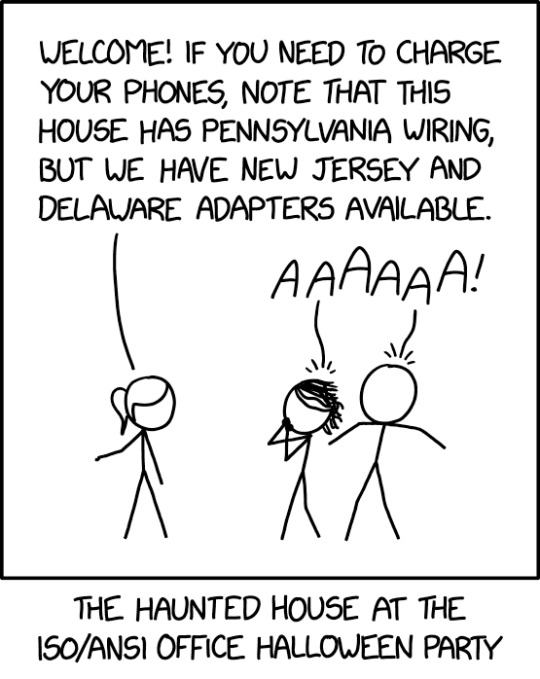
You can leave at any time through the door over there. It's a Louisville door, so you'll need to find a compatible knob. No, don't be silly, that one is a Lexington knob! Of course it won't fit.
Haunted House [Explained]
Transcript Under the Cut
[Ponytail is casually talking to Cueball and Megan, who jump back from her in fear.]
Ponytail: Welcome! If you need to charge your phones, note that this house has Pennsylvania wiring, but we have New Jersey and Delaware adapters available.
Cueball and Megan: AAAAAA!
Caption: The haunted house at the ISO/ANSI office Halloween party
#xkcd#xkcd 2830#haunted house#iso#ansi#webcomics#international organization for standardization#american standards institute
525 notes
·
View notes
Text
Sen. Bernie Sanders displayed photos of starving Palestinian children on the floor of the U.S. Senate on Monday to explain his decision to boycott an upcoming speech by Israeli Prime Minister Benjamin Netanyahu, whom Democratic and Republican leaders formally invited to address a joint meeting of Congress amid Israel's catastrophic assault on Gaza.
The monthslong military campaign has had appalling impacts on Palestinian children, Sanders (I-Vt.) emphasized in his floor remarks Monday, blasting U.S. House Speaker Mike Johnson (R-La.) for eating "fine steaks" at fundraising dinners with his "billionaire friends" while Israel's army blocks critical food aid from entering Gaza, causing kids to starve to death.
"This is a photograph of a child in Gaza taken by Getty," said the Vermont senator as an aide displayed a picture of an emaciated Palestinian child.
The photo was one of several that Sanders showed during his speech, stressing that there are thousands of children in Gaza suffering acute malnutrition as a "direct result of Netanyahu's policies—Netanyahu, the man Speaker Johnson has invited to address Congress."
"No," Sanders said, "I will not be in attendance for that speech."
Watch Sanders' remarks in full:
youtube
Sanders is one of many progressive U.S. lawmakers expected to boycott Netanyahu's speech to Congress, the timing of which remains unclear after the Israeli prime minister's office denied reporting by Punchbowl and other outlets that the date was set for June 13—a day U.S. President Joe Biden is scheduled to be out of the country.
Rep. Pramila Jayapal (D-Wash.), chair of the roughly 100-member Congressional Progressive Caucus, told Axios on Monday that she expects the boycott of Netanyahu's speech to be "large," noting there are "a lot of people who are extremely upset he is coming here."
According to Axios, "Jayapal said she has spoken to several lawmakers who went to Netanyahu's 2015 speech [to Congress] but said they will not attend this time."
Speaking to reporters at the U.S. Capitol on Tuesday, Rep. Alexandria Ocasio-Cortez (D-N.Y.) signaled that she would join the congressional boycott, saying the Israeli prime minister "shouldn't be here."
"I don't think that it is productive for a Republican or a Democrat to invite him," she added.

Netanyahu stands accused by the International Criminal Court of committing war crimes and crimes against humanity in the Gaza Strip, including the "starvation of civilians as a method of warfare" and "willfully causing great suffering." Last month, the ICC's prosecutor formally applied for arrest warrants against Netanyahu and Israeli Defense Minister Yoav Gallant, as well as several Hamas leaders.
Whatever the date of his speech to the U.S. Congress, protests are expected to greet the prime minister upon his arrival in Washington, D.C.
Recent survey data has shown that a majority of Americans oppose Israel's war on Gaza and want the Biden administration to cut off U.S. arms sales to the country.
"He's an indicted felon in Israel with an indictment as a war criminal at the ICC and they've invited him to speak here! Shame," James Zogby, founder of the Arab American Institute, said of Netanyahu late Monday.
#us politics#news#common dreams#2024#sen. Bernie Sanders#Palestine#free palestine#israel#gaza#free gaza#Benjamin Netanyahu#rep. Mike Johnson#punchbowl#Axios#Rep. Pramila Jayapal#Rep. Alexandria Ocasio-Cortez#International Criminal Court#Yoav Gallant#hamas#genocide#James Zogby#Arab American Institute#Youtube
48 notes
·
View notes
Text
idk how this would work in the OIAR bc i just feel like they wouldn’t let anyone from outside look at their files, but i think it would be really funny to have like. a college age researcher show up to the og magnus institute or the OIAR who’s like studying the paranormal or folklore or some shit (cue guy with an actual degree in parapsychology which makes martin shit himself when he tries to start conversation HELPP) who’s just like oh hi guys this is my honors project! :) can i look at some spooky stories? 🤗 and the OIAR/MI staff are like NO. DO NOT LOOK INTO THIS ANY FURTHER RUN FOR YOUR LIFE. but i feel like elias would 100% require that they help this person out, bc he’s evil and he’d want a fear to eat them, and like… it’s just funny to imagine like. the staff trying to keep the true nature of the institute/OIAR away from this totally clueless 22/25 year old and feeding them the silliest statements possible that don’t connect at all to throw them off track so this poor kid is confused and hopefully gives up. but also kinda bittersweet imagining them all coming together to protect a stranger from falling into a world they can no longer escape… the old “it’s too late for me but it’s not too late for you” makes my heart hurt
#they interact w kids in the show and old ppl but they never rly interact w teenagers or actually college students#and i feel like i TOTALLY know people who would ask the institute to see their files like. as an undergrad honors thesis#or a phd defense or something#and like. seeing the research get stymied and the poor kid get frustrated would be kind of sad bc i while researching some niche topics#the institute would be like a treasure trove#and info on contemporary supernatural beliefs is kind of hard to find#but like the tma cast especially—who treated each other terribly—having to band together for the common goal of driving the intern out#what if it was a bonding experience. what if they came together about it#but someone curious enough to seek out the magnus institute is already a little doomed#so how could they prevent that person from finding anything real?#the feeling of hopelessness in tma is so pervasive bc the staff can’t escape. but what if someone else could…#the magnus archives#the magnus protocol#tmagp#tma podcast#the magnus institute#story ideas
42 notes
·
View notes
Note
hey, i’m not the person who asked for mr elias, but i’d like to know what he means by ‘earning’ his attention
I’d like to know as well, actually. He seems sort of amused by the idea of this blog, but he’s taking all the arson threats really seriously??? I’d say to all the Elias’-attention-seekers out there, that’s the wrong sort of attention. Probably he just means you have to write a really good internal memo, or something.
#magposting#answering asks#i’d write HIS internal memos oh my#i understand completely guys#i am standing well back and Looking from a distance#but i understand the want to get closer#tmagpod#the magnus archives#tma#tmagp#the magnus institute#elias bouchard
32 notes
·
View notes
Text
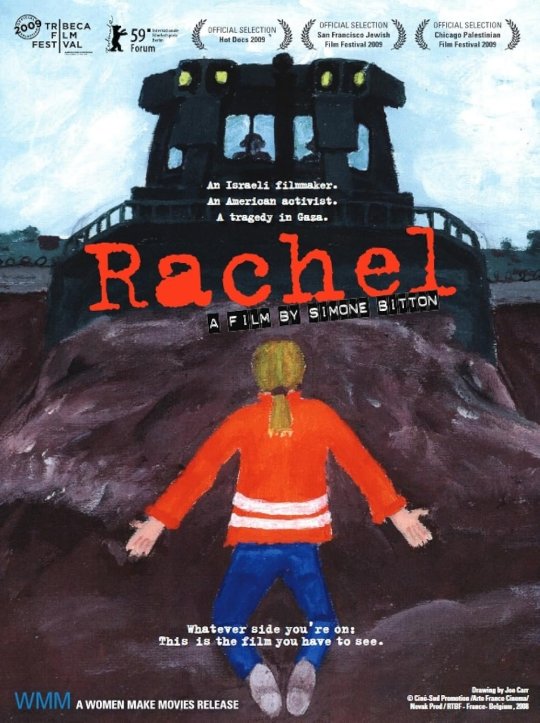
Rachel, (2009, documentary, 1h 40m), (stills), Directed by Simone Bitton, Cinematography by Jacques Bouquin, Edited by Jean-Michel Perez and Catherine Poitevin, Women Make Movies (WMM) (pt. 5) (pt. 1 here) (pt. 2 here) (pt. 3 here) (pt. 4 here) [Palestine Film Institute]





#art#documentary#still#drawing#illustration#poster#rachel corrie#simone bitton#jacques bouquin#jean michel perez#catherine poitevin#women make movies#the rachel corrie foundation for peace & justice#international solidarity movement#palestine film institute#2000s
39 notes
·
View notes
Text

🇻🇪🇬🇾 VENEZUELA HOLDS REFERENDUM TO REASSERT ITS CLAIM TO GUYANA ESSEQUIBO
The Venezuelan Government held a national referendum Sunday to reassert its claim to the lands of Guyana Essequibo, reigniting geopolitical tensions in the region decades in the making.
The Guyana Essequibo region is part of the legacy of the British Empire, and is a region the Monroe Doctrinaires placed firmly in the US sphere of influence that today is dominated by the corporate interests of US oil giant Exxon Mobile.
The government of Guyana issues licenses to Exxon Mobile to drill and process petroleum products off Guyana's shores in an arrangement that the native inhabitants are none-too-happy with.
In Guyana, only 25% of oil profits remain in-country, and a poor system of redistribution has left the country's inhabitants with the lowest Human Development Index in South America, while extreme poverty affects 35.1% of the population.
In this way, Exxon Mobile has become the chief player in this century-old territorial dispute between Guyana and Venezuela.
Even internally, Guyana has major complaints with Exxon Mobile as an imperial extension of the US ruling class, with huge court battles coming to head in recent months against the giant domineering US corporation.
According to a recent article about just such a court battle, The Intercept's Amy Westervelt wrote:
"In Guyana, it’s become hard to distinguish where the oil company ends and the government begins. Exxon executives join the Guyanese president in his suite at cricket matches, and the vice president regularly hosts press conferences to defend the oil company."
The territorial dispute goes back to an 1890's International decision on the location of the borders of what was then British Guyana, a cruel colonial outpost of the British Empire.
At the time, the burgeoning US empire backed Venezuela's claims, a country which the US ruling class was trying to turn into a colony of its own, and were saying the lands in question should be a part of Venezuela, while the British wanted it to be part of its Guyana colony.
A Russian arbitrator, whom many Venezuelan historians believe to have been bribed by the British, ruled in favor of the British Empire's claim.
The territory made up 2/3rds of the territory of Guyana, and as long as the British held their colony, the Venezuelans could do little to change the situation.
In 1966, an agreement was reached to begin negotiations between Guyana and Venezuela to revisit the Essequibo territorial claims, however those negotiations never made any progress and the situation is coming to head now, many decades later.
The UN Secretary General, Antonio Guitierrez, recently referred the matter to the International Court of Justice in the Hague, however the Venezuelan government has no faith in the institution, believing (correctly) that it is merely an extension of Western geopolitical power.
And so, today the Venezuelan government is holding a referendum to reassert its claim to the Guyana Essequibo territory and that they reject any decisions by International institutions to reward Guyana's claims.
#source1
#source2
#source3
#source4
@WorkerSolidarityNews
#venezuela#venezuela news#guyana#guyana news#guyana essequibo#territorial dispute#south america#south america news#south american news#south american politics#politics#geopolitics#news#world news#global news#international news#international affairs#international law#international institutions#united nations#international court of justice#socialist politics#political analysis#political opinion#global politics#international politics#war#wars#war news#war update
16 notes
·
View notes
Text
#TalkieTuesday The AFI shares this wonderful clip from their archive - the late Marcel Marceau, master of mime, waxes lyrical about Buster Keaton’s eyes.
#talkie tuesday#marcel marceau#buster keaton#quote#afi#american film institute#ibks#the international buster keaton society#buster keaton society#the damfinos#damfino#damfamily
12 notes
·
View notes
Text

Scientists use magnetic resonance microscopy as a non-invasive MRI method to visualise internal organs. This spiky-looking specimen is actually a rat kidney.
Photograph: Gary Cowin/AIBN
2023 Australian Institute For Bioengineering And Nanotechnology Image Contest
#gary cowin#photographer#australian institute for bioengineering and nanotechnology image contest#magnetic resonance microscopy#micro photography#internal organs#rat kidney#nature
13 notes
·
View notes
Text


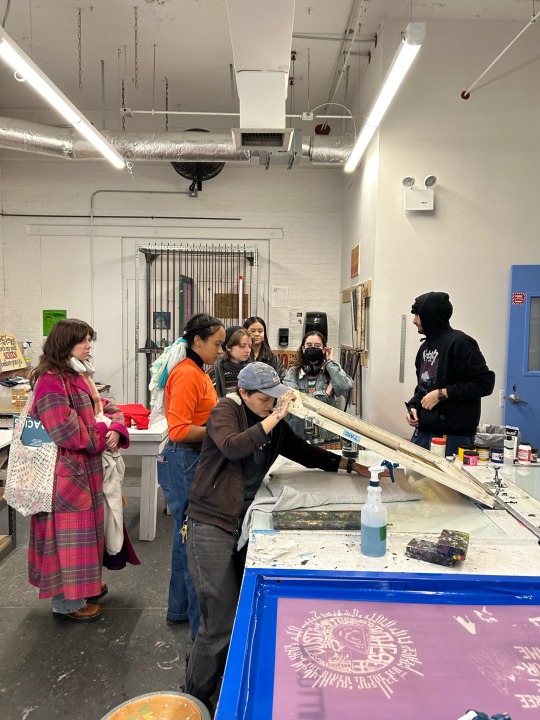
Prints for Palestine at Pratt Institute! Pratt is located in Brooklyn, NY at the border between the Jewish neighborhood of South Williamsburg, the rapidly gentrifying Bedford-Stuyvesant, and the gentrified Fort Greene. As such, we've seen a richly diverse array of voices weighing in on the conflict, but those in support of Palestine have been truly inspiring. As a member of Palestinian Youth Movement on campus said, "this is one of the most intersectional movements this campus has ever seen." On this day of International Solidarity with Palestinian People, we created silk screen designs demanding a permanent ceasefire and printed them on students' clothes and bags for them to wear and show their support. Free Art available now, Free Palestine Now!
26 notes
·
View notes
Text
my favourite part of Death Note is that it's an excellent critique of how ridiculous and horrible police/policing ideology/punitive justice is when taken to its natural conclusion/extreme, but the old man writing it absolutely did not have that in mind -- as evidenced by the fact that he had the Good Normal Police take down This Unhinged Freak Who Thinks We Should Kill Criminals (tho tbf I do think it's a pointed critique of the death penalty - "it's still murder even if they're death row criminals" like it's not spelled out but it's pretty obvious the death penalty is murder too then. But the author kinda gives up on acknowledging the normal "justice" system isn't aren't 100% prefect by the end). like I'm not 100% certain but I do think Light's dad was just made a policeman for plot convenience & possibly to explain why criminals take up so much space in Light's head, not because the Kira's ideology could only be developed by the child of a cop. (L would have used that as evidence it was the case.) Also the author said Mr. Cop Father is good.
#i have this idea that children natrually take more extreme positions than their parents b/c parenst will hide their misgivings when they#think the position they nominally believe in is the right one. esp if it relates to their job.#death note#light yagami#Soichiro Yagami#yagami light#death note analysis#yes this is in contrast to the post about 'god' i just reblogged. wanted to make it clear i see light and his father#as having essentially the same ideology. i mean his dad disagrees with kira but like. light literally got it all from him.#light who wants to make his father proud and deicdes his dad doesn't understand his own ideology when he rejects kira...#okay but legit i think the reason why kira upset those international cops is because THEY couldn't be hte ones to kill the criminals? like#it was only because Kira was an outside force not part of the institutions? that's kidna the vibe i got at the beginning of the manga#i said this#i think i might hae spelling critique the british way? not sure how else to spell it tho. i always put the 'u' in 'favourite' btw#chem's death note arc#this has been in my head for like months now but only got the motivation to type it out bc of that last post lol
40 notes
·
View notes